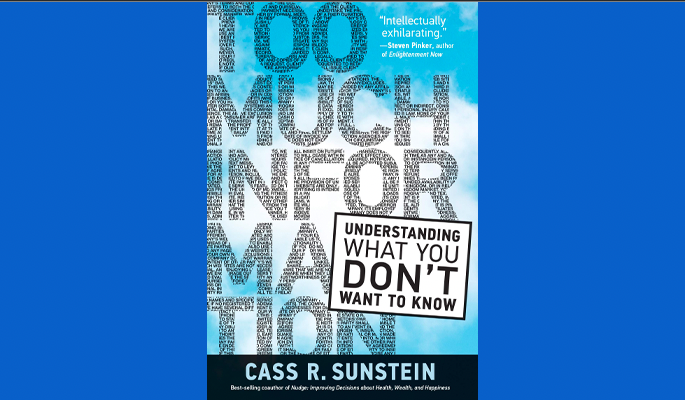School of Law Author Series 2020/21. Seminar 2 with Professor Cass Sunstein
School of Law Author Series 2020/21 - Conversations with Donna Lyons. Seminar 2 with Professor Cass Sunstein.
Professor Cass Sunstein speaking at Trinity School of Law on ‘Too Much Information: Understanding What You Don’t Want to Know’.
A recording of this seminar can be viewed HERE.
Date and time: 3pm-4pm Irish Standard Time, Friday, 11 September 2020
Cass Sunstein, Robert Walmsley University Professor at Harvard, will be discussing this important new book with Donna Lyons, Trinity College Dublin School of Law on Friday, on 11 September 2020.
This event will take place at 3pm Irish Standard Time and 10am US Eastern Standard Time. The event is free and open to all. It will be possible for attendees to join the webinar directly via the link on Zoom and the event will be simultaneously live-streamed on the Law School Facebook page. There will be an opportunity for attendees to ask questions of Professor Sunstein during the session.
How much information is too much? Do we need to know how many calories are in the giant vat of popcorn that we bought on our way into the movie theatre? Do we want to know if we are genetically predisposed to a certain disease? Can we do anything useful with next week's weather forecast for Paris if we are not in Paris? In Too Much Information, Cass Sunstein examines the effects of information on our lives. Policymakers emphasize “the right to know,” but Sunstein takes a different perspective, arguing that the focus should be on human well-being and what information contributes to it. Government should require companies, employers, hospitals, and others to disclose information not because of a general “right to know” but when the information in question would significantly improve people's lives.
Sunstein argues that the information on warnings and mandatory labels is often confusing or irrelevant, yielding no benefit. He finds that people avoid information if they think it will make them sad (and seek information they think will make them happy). Our information avoidance and information seeking is notably heterogeneous—some of us do want to know the popcorn calorie count, others do not. Of course, says Sunstein, we are better off with stop signs, warnings on prescription drugs, and reminders about payment due dates. But sometimes less is more. What we need is more clarity about what information is actually doing or achieving.


